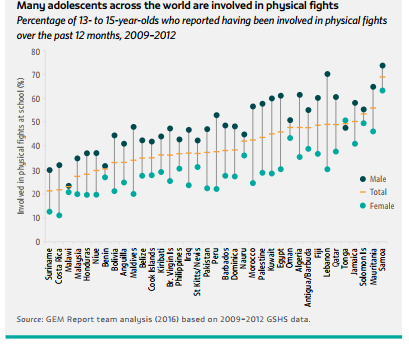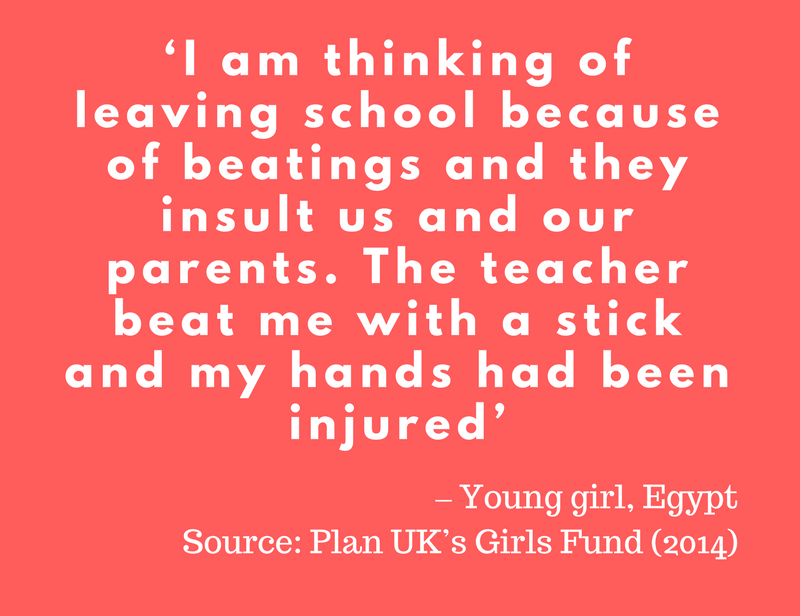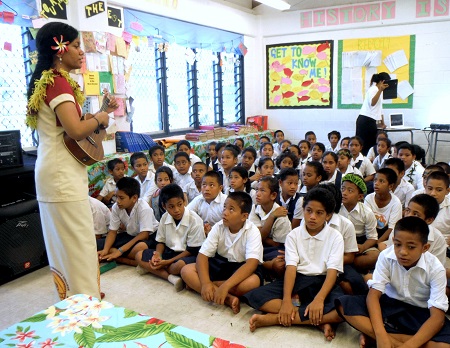Oceania/samoa/GEM Report
Resumen: El castigo corporal sólo fue prohibido en las escuelas de Samoa en 2013. Sin embargo, cuatro años después, el tema volvió a ser discutido. Afortunadamente, hace unos días, el Gabinete decidió mantener la prohibición. Entre los que han cuestionado si la prohibición de los castigos corporales es correcta, un alto funcionario de educación se preocupó de que la prohibición sirviera para proteger sólo los derechos del niño y no los del maestro . Millones de niños de todo el mundo sufren violencia física en la escuela bajo el disfraz de disciplina: más de la mitad de los niños de todo el mundo viven en países donde no tienen protección legal contra el castigo corporal , de los cuales el 45% vive en Asia meridional. Hasta diciembre de 2014, 122 estados habían prohibido el castigo corporal en las escuelas; 76 no tenía tales prohibiciones. En Samoa, el debate se centró en la prevalencia de la violencia en las escuelas, que se acumuló en el gobierno cerrando una escuela secundaria conectada a varias peleas violentas entre estudiantes. La Encuesta Mundial de Salud Estudiantil basada en la Escuela (GSHS) muestra hasta qué punto existe una cultura de violencia entre los estudiantes en el país. Como muestra el Informe GEM de 2016 , aproximadamente el 70% de los adolescentes en Samoa informaron que habían estado involucrados en una pelea física en los últimos 12 meses, mucho mayor que cualquier otro país que participó en la encuesta.
Corporal punishment was only banned in Samoan schools in 2013. Four years later, however, the issue was once again up for debate. Thankfully, a matter of days ago,Cabinet decided to uphold the ban. Amongst those who have questioned whether the ban on corporal punishment is correct was a leading education official who worried that the ban served to protect only the child’s rights and not those of the teacher.
Millions of children around the world suffer physical violence at school under the guise of discipline: over one-half of all children worldwide live in countries where they have no legal protection from corporal punishment, of which 45% live in South Asia. As of December 2014, 122 states had prohibited corporal punishment in schools; 76 had no such prohibitions.
 In Samoa, the debate centred on the prevalence of violence in schools, which cumulated in the government closing a high school connected to several violent fights between students. The Global School-based Student Health Survey (GSHS) shows the extent to which there is a culture of violence among students in the country. As the 2016 GEM Report showed, about 70% of adolescents in Samoa reported that they had been involved in a physical fight in the past 12 months, much higher than any other country that participated in the survey.
In Samoa, the debate centred on the prevalence of violence in schools, which cumulated in the government closing a high school connected to several violent fights between students. The Global School-based Student Health Survey (GSHS) shows the extent to which there is a culture of violence among students in the country. As the 2016 GEM Report showed, about 70% of adolescents in Samoa reported that they had been involved in a physical fight in the past 12 months, much higher than any other country that participated in the survey.
Up until as recently as last month, the Education Minister, Loau Keneti Sio, had suggested that corporal punishment could be an effective way to decrease the instances of school-based violence. However, a visit from a United Nations panel, which urged the government to reject efforts to reintroduce corporal punishment for students, appears to have influenced the government’s thinking on the issue.
 This was the right decision. Corporal punishment violates children’s rights. It undermines multiple other rights as well, including their right to education. As with many policies, this one has a gendered dimension, affecting boys more than girls. As may be expected, it has also been shown to have clear links to increased student drop out, especially for children from low income and migrant families already disadvantaged by economic pressures.
This was the right decision. Corporal punishment violates children’s rights. It undermines multiple other rights as well, including their right to education. As with many policies, this one has a gendered dimension, affecting boys more than girls. As may be expected, it has also been shown to have clear links to increased student drop out, especially for children from low income and migrant families already disadvantaged by economic pressures.
 Recognizing its prevalence as a form of physical violence suffered in schools, corporal punishment is covered by one of the thematic indicators of the SDG monitoring framework, under Target 4a, which focuses on providing safe and effective learning environments for all. This will help remind countries to recognize that it is not permissible to allow corporal punishment to go unchecked.
Recognizing its prevalence as a form of physical violence suffered in schools, corporal punishment is covered by one of the thematic indicators of the SDG monitoring framework, under Target 4a, which focuses on providing safe and effective learning environments for all. This will help remind countries to recognize that it is not permissible to allow corporal punishment to go unchecked.
Fuente: https://gemreportunesco.wordpress.com/2017/08/24/samoa-votes-against-reintroducing-corporal-punishment-in-schools/#more-10624
Imagen tomada de: http://www.amsamoa.edu/pressreleases/images/140508Calling.JPG






 Users Today : 290
Users Today : 290 Total Users : 35459885
Total Users : 35459885 Views Today : 465
Views Today : 465 Total views : 3418437
Total views : 3418437